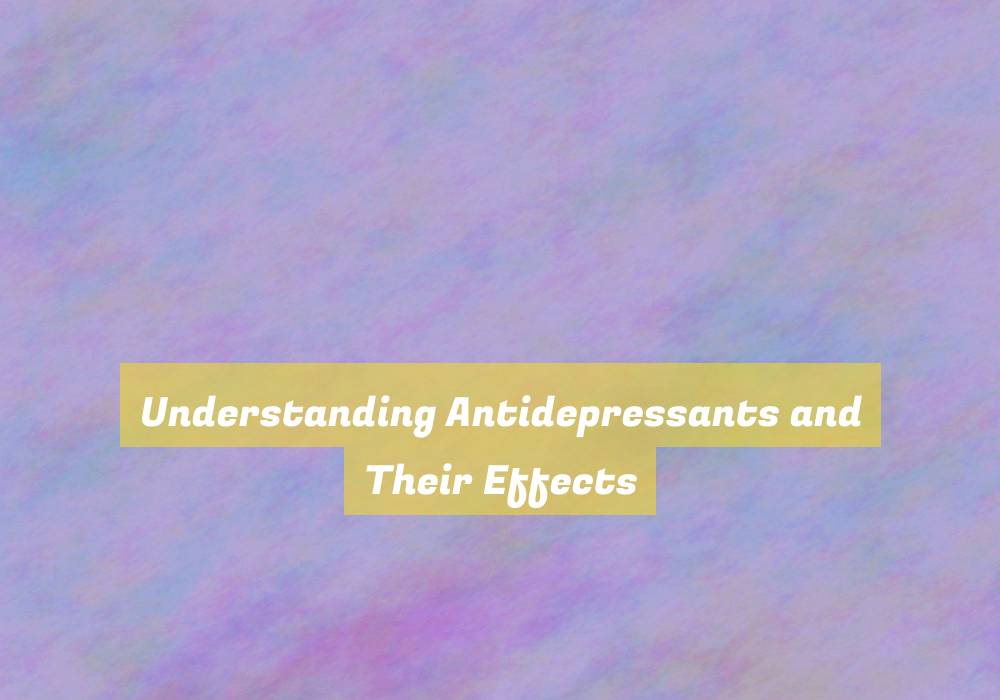Understanding Antidepressants and Their Effects
As you navigate the complex landscape of mental health, itG??s not uncommon to encounter dark clouds that seem to linger longer than they should. This is where antidepressants come into play, serving as beacons of hope in the stormy seas of depression and anxiety.
But do you truly understand how these medications work and their potential impact on your well-being? LetG??s unravel the mysteries behind antidepressants and shed light on their effects, both positive and potentially negative, to help you make informed decisions about your mental health journey.
Types of Antidepressants
When selecting an antidepressant, itG??s important to understand the different types available and how they may affect you.
The main types of antidepressants include selective serotonin reuptake inhibitors (SSRIs), serotonin-norepinephrine reuptake inhibitors (SNRIs), tricyclic antidepressants (TCAs), and atypical antidepressants.
SSRIs, such as Prozac and Zoloft, are often the first choice due to their relatively mild side effects.
SNRIs, like Cymbalta and Effexor, work by increasing levels of serotonin and norepinephrine in the brain.
TCAs, including Tofranil and Pamelor, are older antidepressants that can be effective but may have more side effects.
Atypical antidepressants, such as Wellbutrin and Remeron, work differently than the other types and may be prescribed when other medications havenG??t been effective.
Each type of antidepressant affects neurotransmitters in the brain in different ways, so itG??s important to work closely with your healthcare provider to find the most suitable option for you.
Keep in mind that responses to antidepressants vary from person to person, and it may take some trial and error to find the right medication and dosage that works best for you.
Mechanism of Action
Understanding how different types of antidepressants affect neurotransmitters in the brain is crucial in grasping their mechanism of action and their potential effects on your mental health.
Selective serotonin reuptake inhibitors (SSRIs), for instance, work by blocking the reabsorption (reuptake) of serotonin in the brain, leading to increased levels of this G??feel-goodG?? neurotransmitter. This mechanism is believed to help alleviate symptoms of depression and improve mood.
Similarly, serotonin-norepinephrine reuptake inhibitors (SNRIs) also prevent the reuptake of serotonin and norepinephrine, contributing to enhanced neurotransmitter activity in the brain.
On the other hand, tricyclic antidepressants (TCAs) and monoamine oxidase inhibitors (MAOIs) function by different mechanisms, including blocking the reuptake of certain neurotransmitters and inhibiting the activity of enzymes that break down these chemicals. These actions ultimately result in increased levels of neurotransmitters available to transmit messages between nerve cells, potentially lifting mood and reducing symptoms of depression.
Potential Side Effects
While antidepressants can be effective in alleviating symptoms of depression, they may also cause various potential side effects. Common side effects include nausea, weight gain, drowsiness, insomnia, and sexual dysfunction. These effects can be temporary or persistent, and their severity varies among individuals. ItG??s important to communicate openly with your healthcare provider about any side effects you experience, as they may be able to adjust your medication or offer coping strategies.
In some cases, antidepressants can also lead to more serious side effects such as increased suicidal thoughts, especially in young adults. ItG??s crucial to seek immediate medical attention if you or someone you know experiences a sudden worsening of depression, unusual changes in behavior, or thoughts of self-harm while taking antidepressants.
Moreover, certain antidepressants may have specific side effects based on their class. For instance, selective serotonin reuptake inhibitors (SSRIs) can cause agitation, serotonin-norepinephrine reuptake inhibitors (SNRIs) may lead to elevated blood pressure, and tricyclic antidepressants can cause heart rhythm disturbances.
Always follow your doctorG??s guidance when taking antidepressants, and donG??t hesitate to address any concerns about potential side effects.
Impact on Mental Health
If you have been experiencing any changes in your mood or mental state while taking antidepressants, itG??s important to recognize the potential impact on your mental health. Antidepressants can have a significant effect on your mental well-being. TheyG??re designed to alleviate symptoms of depression, anxiety, or other mental health conditions, but they can also influence your overall mental state in various ways.
ItG??s common to experience an improvement in your mood and a reduction in feelings of sadness or hopelessness. However, some individuals may also notice changes in their emotional responsiveness or a decrease in certain emotions while taking antidepressants. ItG??s crucial to communicate any changes you notice to your healthcare provider, as these adjustments can impact your overall mental health and well-being.
Additionally, antidepressants can take time to reach their full effectiveness, so itG??s important to be patient and continue monitoring your mental health throughout the treatment process. Regular communication with your healthcare provider is essential to ensure that the medication is positively contributing to your mental health.
Conclusion
In conclusion, understanding antidepressants and their effects is crucial for anyone dealing with mental health issues.
With various types of antidepressants and their different mechanisms of action, itG??s important to work closely with a healthcare professional to find the right medication and dosage for you.
While there may be potential side effects, the impact on mental health can be significant, ultimately leading to improved quality of life for those in need.





